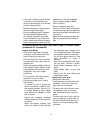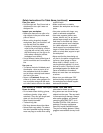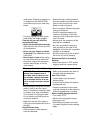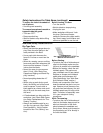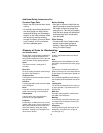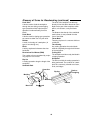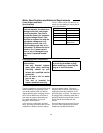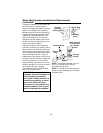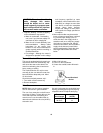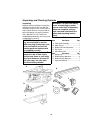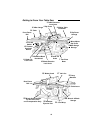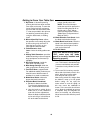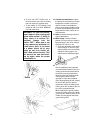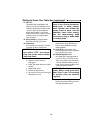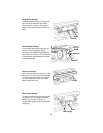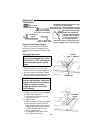
13
CAUTION: To reduce the risk of
motor damage, this motor
should be blown out or vacu-
umed frequently to prevent saw-
dust buildup which will interfere
with normal motor ventilation.
1. Frequent “blowing” of fuses or tripping
of circuit breakers may result if:
a. Motor is overloaded - Overloading
can occur if you feed too rapidly or if
saw blade is dull or misaligned.
b. Motor circuit is fused differently from
recommendations - Always follow
instructions for the proper fuse/
breaker. Do not use a fuse/breaker of
greater capacity without consulting a
qualified electrician.
c. Low voltage - Although the motor is
designed for operation on the voltage
and frequency specified on motor
nameplate, normal loads will be han-
dled safely on voltage not more than
10% above or below the nameplate
voltage. Heavy loads, however,
require that voltage at motor termi-
nals equals the voltage specified on
nameplate.
2. Most motor troubles may be traced to
loose or incorrect connections, overload-
ing, reduced input voltage (such as
small size wire in the supply circuit or
extension cord) or to overly long supply
circuit wire or extension cord. Always
check the connections, the load and the
supply circuit whenever motor fails to
perform satisfactorily. Check wire sizes
and length with the Wire Size Chart
below.
Thermal Overload Protector
This saw is equipped with a thermal over-
load device which will automatically “trip”
and cause the saw to shut down if the
motor is overheating due to continuous
heavy cutting or stalling.
The overload device can only be reset
manually by the user after the motor has
been allowed to adequately cool. Allow
15-30 minutes.
Should the overload protector “trip”:
1. Turn switch off and remove key.
2. Remove workpiece.
3. Wait 15-30 minutes.
4. Push in on the reset button.
5. If motor has cooled, button will remain
in.
Wire Sizes
NOTE: Make sure the proper extension
cord is used and is in good condition.
The use of any extension cord will cause
some loss of power. To keep this to a min-
imum and to prevent overheating and
motor burn-out, use the table shown to
determine the minimum wire size (A.W.G.)
extension cord.
Use only 3-wire extension cords which have
3-prong grounding type plugs and 3-prong
receptacles which accept the tool’s plug.
Thermal Overload
Device
Extension
Cord Length
Gauge
(A.W.G.)
0-25 Ft.
26-50 Ft.
14
12



